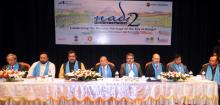Speech by Hon’ble Foreign Minister at the inaugural ceremony of NADI-2, National Shilpakala Academy Auditorium

H.E. Mr. Ram Madhav, National General Secretary, BJP and Director, India Foundation
H. E. Mr. Shahriar Alam, Hon’ble State Minister for Foreign Affairs, Bangladesh
H.E. Mr. Harsh Vardhan Shringla, High Commissioner of India
Excellencies,
Distinguished guests,
Ladies and gentlemen,
Assalamualaikum/Adab & Good evening,
I would like to begin by thanking the ‘Asian Confluence’ and ‘Friends of Bangladesh’ for inviting me to inaugurate this Conference. Today I see many eminent persons and scholars from Bangladesh, India and other countries. I welcome you all to Bangladesh, the land of rivers.
Distinguished guests,
Rivers are sources of life and livelihood for the human being. Historically, people have always preferred to build their habitat on the banks of rivers. This symbiotic relationship between man and river had resulted in the foundation of great civilizations on the banks of the rivers throughout the world. Similarly, great rivers are the cultural and economic backbone of South Asia. The Ganges, Indus and Brahmaputra have contributed to the rise and prosperity of some of the earliest civilizations in history and today are the source of livelihood for millions.
The South Asian river basins support rich ecosystems and irrigate millions of hectares of fields, thereby supporting some of the highest population densities in the world. Those mighty River systems have also produced a complex ecosystem near the estuary-the Sundarbans- one of the largest mangrove forests of the world. The Sundarbans is vital for maintenance of biodiversity. Thus, our rivers are playing an important role in ensuring the diversity of living things. The river systems in our region are also playing an important role in the day to day economic life of its inhabitants. Most of the great industrial and commercial hubs in this region are located along those rivers.
Dear participants,
As many as 57 cross-boundary rivers flow through Bangladesh down to the Bay of Bengal. Out of these, 54 rivers are coming through Indian territory. Our region could take advantage of the trans-boundary rivers for inter-country means of riverine transport. In a limited way, it is already taking place. The Indo-Bangladesh Protocol on Inland Water Transit and Trade (PIWTT) has been operational since 1972 by virtue of which Indian cargo is transported by vessels from mainland to north-east India using Bangladesh’s inland water ways. Meanwhile, the PIWTT has been renewed in 2015 and many new ports of call have been included. Signing of the Coastal Shipping has opened up new avenues of connectivity and trade facilitation. We are also looking at plying of passenger and cruise vessels in these protocol routes. An MOU for movement of passenger and cruise vessels in coastal shipping routes and Inland Water Protocol Routes has been signed on 8 April 2017.
Dear participants,
Mutual respect and understanding of each other’s perspectives has matured the Bangladesh-India relationship over the years. The relationship has its genesis in our War of Liberation in 1971. As we speak of India’s contribution as a whole in our liberation war, we recognize the North-east’s special role. The relationship of Bangladesh with the northeastern states of India, therefore, occupies an important position in the overall Bangladesh-India bilateral relations. Riding on this, we are now looking at greater economic integration between Bangladesh and India’s North-east for mutual benefit. Trade and connectivity through rivers would facilitate North-east’s socio–economic development and contribute to our export growth.
Distinguished Guests,
High transport costs continue to be the greatest impediment to trade competitiveness of LDCs and equitable access of their products to global as well as regional markets. A greater opportunity to use the riverine routes and improvement of the quality of the river connectivity should be at the core of any strategy aiming at stimulating exports and promoting the participation of domestic economy in regional markets and beyond in the global chains of production.
Dear participants,
It is very heartening that the peoples of our region have come to appreciate the need for cooperation among the countries in various sectors. Given the common heritage that they share among them can forge an enabling environment for greater people to people contact.
In this backdrop, the NADI-2 Dialogue with the theme “Celebrating Common Riverine Heritage of the Bay of Bengal: Perspectives from Bangladesh and India” organized by the ‘Asian Confluence’ and ‘Friends of Bangladesh’ in coordination with the Ministry of Foreign Affairs of Bangladesh is a timely initiative whose time has come. I believe this Dialogue will achieve its objective by focusing on the possibilities of enhancing people to people contacts through creative use of contiguous rivers, promoting environment friendly trade and tourism, and thereby, ensuring common prosperity for our region.
With these words, I declare this Asian Confluence River Festival 2017 (Nadi 2) open. I wish you all an engaging and successful dialogue.
Thank you.
Joy Bangla Joy Bangabandhu
Long Live Bangladesh-India Friendship








